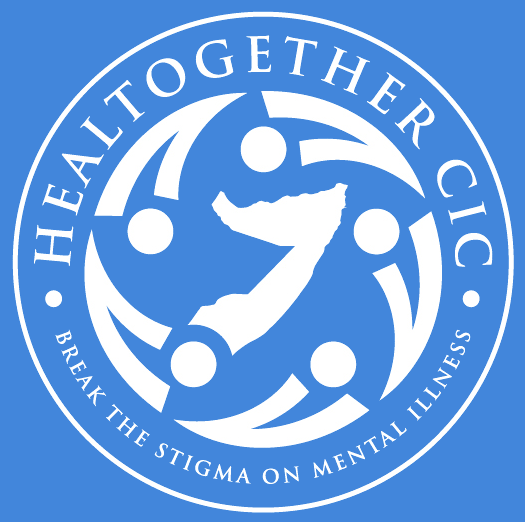
Healtogether CIC
Break the stigma on mental Illness.
What is Mental Illnes?
There are many types of mental illness and, depending on how mental illness is described, 10 or 25% of people living in the United Kingdom can be considered to have had a mental illness at some point in their lives. Like many other illnesses it is common and can occur at any time and happen to any one of us.
Severe mental illness is a term used for longstanding conditions and affects only about 1% of the population. There are many types of mental illness but the easiest way of defining them is as either psychotic or neurotic. Most conditions fit into either of these categories.
Neurotic Conditions
Neurotic conditions are related to ‘normal’ emotions and are the most common type of mental illness. Many of us feel depressed for example and whilst it occurs is unpleasant. However if you have clinical depression it is a far deeper experience than ‘feeling depressed’. Having clinical depression is an illness that has a marked effect on one's life, preventing people from being able to work or look after themselves properly and in extreme cases, leads to suicide. Other examples of neurotic illnesses are Phobias, Obsessive Compulsive Disorder and Anxiety.
Psychotic Conditions
These conditions are different from neuroses being unrelated to normal emotions. Psychosis is a word used to describe symptoms or experiences that happen together. These symptoms cause the patient to not experience reality like most people. Someone with psychotic symptoms may:
Developing Psychosis
Concerning Signs
- Tension
- Suspisioness
- Depression
- Anxiety
- Irritability
- Anger
- Mood swings
- Sleep disturbances
- Appetite changes
- Memory problems
- Withdrawel
Early Warnings
- Emerging unusual beliefs
- Perception that things have changes
- Belief that thoughts are speeded up or slowed down
- Loss of engergy or motivation
Symptomps of Psychosis
- Hallucinations
- Delusions
- Thought disorder

Increasing Concern >
These symptoms can occur with a number of psychotic illnesses including schizophrenia. People suffering from Bipolar Disorder (also known as Manic–Depression) and psychotic depression, which are mood disorders, can also experience these symptoms.
Developing Schizophrenia
Concerning Signs
- Poor ability to 'keep going' and neglecting personal care
- Diminished ability to concentrate
- Apathy, including emotional withdrawal and blunting of emotions
- Finding it hard to be around or take an interest in others
Early Warnings
- Major life changes such as going to university
- Bereavement
- Break up of a relationship
- Losing a job
- There is good evidence to indicate that the use of cannabis doubles the risk of schizophrenia
Symptomps of Schizophrenia
- Hallucinations
- Delusions
- Thought disorder
- Feelings of being controlled

Increasing Concern >
Looking into the future of someone who is diagnosed with this condition
- 1 in 5 will get better within 5 years of their first episode of the illness
- In 3 out of 5 cases will improve but will have episodes when their symptoms are worse than others.
- 1 in 5 people diagnosed with schizophrenia will continue to have problematic symptoms.
If diagnosis is made promptly, and treatment is begun as soon as possible,the need for admission to hospital is reduced and the patient is more likely to be able live at home and hold down a job.
Developing Depression
Concerning Signs
- Feel unhappy most of the time (but may feel a little better in the evenings).
- Lose interest in life and can't enjoy anything.
- Can't cope with things that you used to.
- Feel utterly tired.
- Feel restless and agitated.
- Lose appetite and weight (some people find they do the reverse and put on weight).
- Take 1-2 hours to get off to sleep, and then wake up earlier than usual.
- Lose interest in sex.
- Lose your self-confidence.
- Feel useless, inadequate and hopeless.
- Avoid other people.
- Feel irritable.
- Feel worse at a particular time each day, usually in the morning.
- Think of suicide.
Early Warnings
- When your feelings of depression are worse than usual and don't seem to get any better.
- When your feelings of depression affect your work, interests and feelings towards your family and friends.
- If you find yourself feeling that life is not worth living, or that other people would be better off without you.
- Finding it hard to be around or take an interest in others.
Symptomps of Depression
- Feeling sad or down.
- Confused thinking or reduced ability to concentrate.
- Excessive fears or worries, or extreme feelings of guilt.
- Extreme mood changes of highs and lows.
- Withdrawal from friends and activities.
- Significant tiredness, low energy or problems sleeping.

Increasing Concern >
You may not realise how depressed you are for a while, especially if it has come on gradually.
You try to struggle on and may even start to blame yourself for being lazy or lacking willpower.
It sometimes takes a friend or a partner to persuade you that there really is a problem which can be helped.
You may start to notice pains, constant headaches or sleeplessness. Physical symptoms like this can be the first sign of depression.
Reach out to your GP, if this is too difficult for you.
Reach out to people you trust or community services that are there to assit and support you. They might be able to help you decide what services are available for you.
More information
Useful websites for further information: